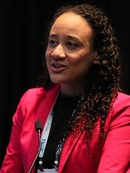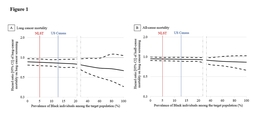A new study emphasizes the importance of equitable and inclusive health screening programs and the need for better outreach to minority populations.

Prosper
"We have an opportunity to make some progress right now on health and social disparities, and I wanted some additional evidence to say that not only is it the right thing to do to help people, but also to ensure that a screening test is achieving its greatest benefit across the population." said Ashley Elizabeth Prosper, MD, section chief of cardiothoracic imaging and co-director of the Lung Screening Program at the University of California, Los Angeles.
At the heart of Dr. Prosper's study lies data from the National Lung Screening Trial (NLST) conducted over the course of 21 months starting in 2002. The NLST compared low-dose helical CT (LDCT) and standard chest X-ray as methods for detecting lung cancer to determine their effect on lung-cancer death rates in a high-risk population. Both methods have been used for early detection, but their respective effects on lung cancer mortality rates were unknown.
The NLST included 53,452 current or former heavy smokers across America, ages 55 to 74. It demonstrated a 20% reduction in lung cancer mortality when LDCT was used. However, despite deliberate outreach efforts by its coordinators, the trial finished with a disproportionate representation of White subjects as compared to those of any other race. Black individuals comprised a mere 4.4% of the NLST population.
Making the Case for Equitable Recruitment
Dr. Prosper wondered if or how the mortality rates might have been affected if there were more Black subjects included in the study.
"Black individuals in the NLST had the best improvement in outcomes, leading us to question whether we might have seen an even greater mortality reduction if we had been able to recruit more for the trial," Dr. Prosper said.

She and her fellow researcher, Kosuke Inoue, MD, PhD, assistant professor in social epidemiology at Kyoto University in Japan, performed a secondary analysis of the original NLST data using transportability, a statistical approach in which clinical trial results can be applied to a target population.
The method allowed them to estimate potential mortality reduction benefits for synthetic populations that included varying proportions of Black individuals, varying proportions of Black and female individuals, and varying proportions of Black individuals and current smokers.
They found that increasing the proportions of Black individuals in their synthetic populations resulted in greater relative reduction of lung cancer mortality with LDCT screening than seen in the NLST.
For example, in a population with 40% Black subjects, the relative reduction in lung cancer mortality with LDCT screening increased to 26% across the population as compared to 20% in the NLST.
Dr. Prosper acknowledged that there are limitations to transportability and stressed that while the method is useful, there is a limit to what can be achieved with statistics.
"The best way to get good data is to do clinical trials with real populations. You want to recruit equitably, but you stretch a little bit with transportability," she said. "It is imperative that screening programs are inclusive of Black individuals who are at the highest risk of lung cancer."
Dedicated to clearing a path for access to screening, Dr. Prosper is engaged in several outreach efforts and is partnering with local clinics and organizations to get the message about screening to populations that to date have not been effectively reached.
"Lung screening is such an important patient interaction because we, as radiologists, have that opportunity to participate in shared decision making before the screen to talk about results and next steps," she said. "Our interaction in the screening environment might be an important key in making that individual stay on for treatment or further testing."
Access the presentation, "Might Lung Cancer Screening Mortality Benefits Be Even Greater Than Expected Once More African American/Black Smokers are Included?," (SSCH08-6) on demand at Meeting.RSNA.org.

